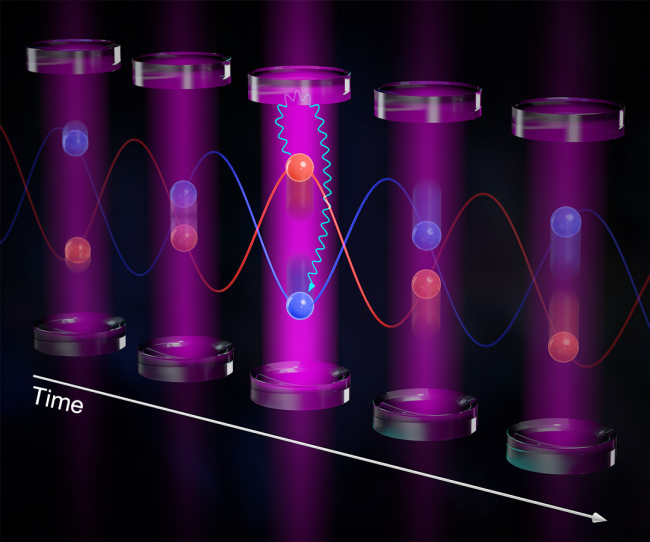Momentum-exchange interactions in a Bragg atom interferometer suppress Doppler dephasing
| Author | |
|---|---|
| Abstract |
Large ensembles of laser-cooled atoms interacting through infinite-range photon-mediated interactions are powerful platforms for quantum simulation and sensing. Here we realize momentum-exchange interactions in which pairs of atoms exchange their momentum states by collective emission and absorption of photons from a common cavity mode, a process equivalent to a spin-exchange or XX collective Heisenberg interaction. The momentum-exchange interaction leads to an observed all-to-all Ising-like interaction in a matter-wave interferometer. |
| Year of Publication |
2024
|
| Date Published |
2024-05
|
| Journal Title |
Science
|
| Volume |
384
|
| Issue |
6695
|
| Start Page or Article ID |
551-556
|
| ISSN Number |
0036-8075, 1095-9203
|
| DOI | |
| Download citation | |
| JILA PI | |
| Related JILA Highlights | |
| Associated Institutes | |
Journal Article
|
|
| JILA Topics | |
| Publication Status | |
| Publication Image |

|


 The Physics Frontiers Centers (PFC) program supports university-based centers and institutes where the collective efforts of a larger group of individuals can enable transformational advances in the most promising research areas. The program is designed to foster major breakthroughs at the intellectual frontiers of physics by providing needed resources such as combinations of talents, skills, disciplines, and/or specialized infrastructure, not usually available to individual investigators or small groups, in an environment in which the collective efforts of the larger group can be shown to be seminal to promoting significant progress in the science and the education of students. PFCs also include creative, substantive activities aimed at enhancing education, broadening participation of traditionally underrepresented groups, and outreach to the scientific community and general public.
The Physics Frontiers Centers (PFC) program supports university-based centers and institutes where the collective efforts of a larger group of individuals can enable transformational advances in the most promising research areas. The program is designed to foster major breakthroughs at the intellectual frontiers of physics by providing needed resources such as combinations of talents, skills, disciplines, and/or specialized infrastructure, not usually available to individual investigators or small groups, in an environment in which the collective efforts of the larger group can be shown to be seminal to promoting significant progress in the science and the education of students. PFCs also include creative, substantive activities aimed at enhancing education, broadening participation of traditionally underrepresented groups, and outreach to the scientific community and general public.